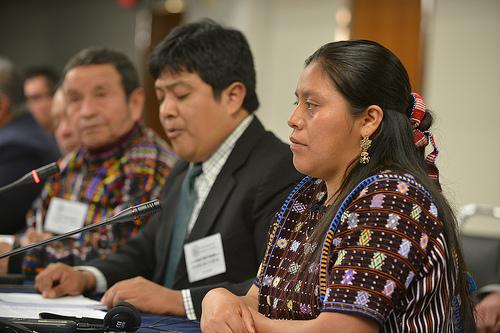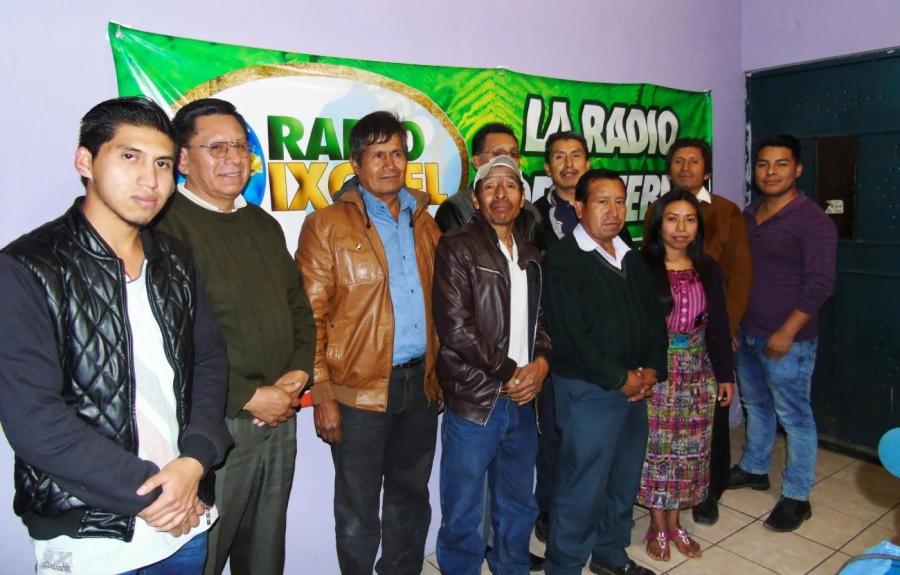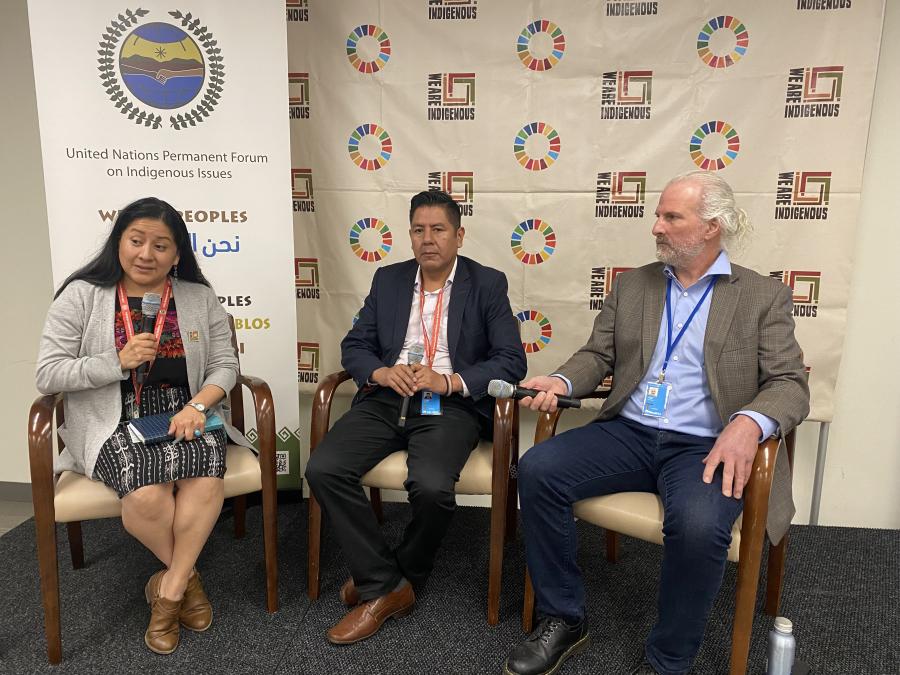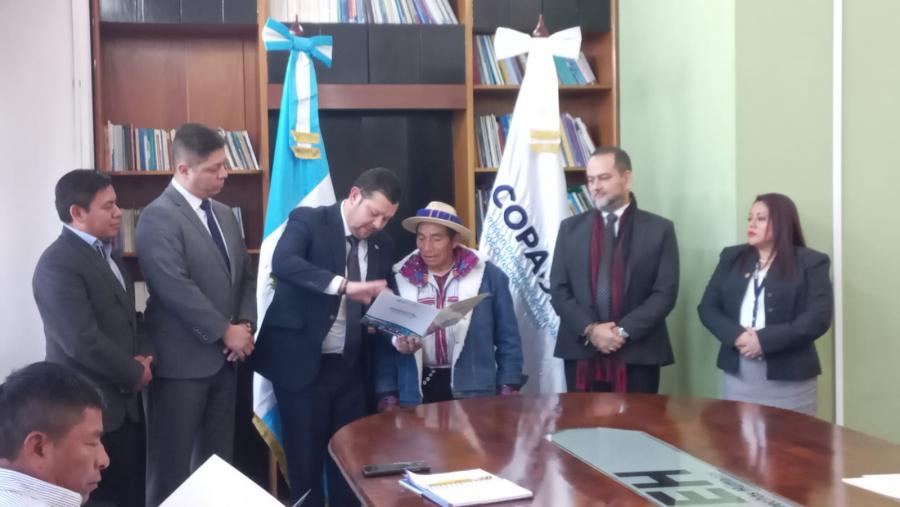
By Jessie Cherofsky
“For over 600 years, they’ve denied us our voice. Today, we will vindicate our claims. Today, we bring a tiny grain of sand to this process,” Alma Temaj told me on March 15, 2013 in the lobby of the Inter-American Commission on Human Rights (IACHR) of the Organization of American States in Washington, DC. It was an hour before the hearing on the Situation of the Right to Freedom of Expression of the Indigenous Peoples in Guatemala, in which Alma and four other representatives of Guatemala’s community radio movement would have the opportunity to address, as Alma put it, the “monoculturalism, discrimination, and racism” inherent in the Guatemalan state’s restriction of Indigenous communities’ access to radio frequencies.
As César Gomez, a Poqomam Maya Cultural Survival staff member, defined it in his testimony at the hearing, “Community radio is radio that belongs to a community organization, uses the Indigenous language in its programming, is non-profit, and invites the participation of all sectors of the community, even government institutions.” Temaj, a Mam Maya leader in the Mujb’ab’ Lyol radio association (Meeting of Expressions) in Guatemala, characterized community radio as “an invaluable tool that contributes to the effort to strengthen and conserve our languages, culture, traditions, and worldview.” Community radio offers alternative programming and provides a platform for the diverse perspectives present within a community. In many rural communities, high levels of illiteracy limit access to print media, making community radio what IACHR Rapporteur on the Rights of Indigenous Peoples, Dinah Shelton, (31:55-33:06) called “the primary method by which information is transmitted.” In remote communities, many Indigenous people speak only their native language and mainstream radio broadcasting is inaccessible to them. Community radio is an ideal medium to address the distinct needs of small Indigenous communities. Indigenous Peoples are not only entitled to their own media as per the UN Declaration on the Rights of Indigenous Peoples; they are also guaranteed “special measures” to access those rights in the Inter-American Convention and International Labor Organization Convention 169.
However, despite these guarantees by international bodies and by Guatemala’s own 1996 Peace Accords and constitution, the Guatemalan telecommunications law does not allow licenses for community radio. Stations obtain licenses at public auctions; the sole way to obtain one is by making the winning bid, a mechanism that is inherently prohibitive for the budgets of small, non-profit stations whose operation depends, in many cases, entirely upon volunteers.
In October 2011, the community radio movement brought its case to the Guatemalan Constitutional Court, which, while not declaring the current telecommunications law to be a formal violation of equality, exhorted the Guatemalan Congress to establish a mechanism by which Indigenous community radios could gain licenses. Following the government’s failure to establish such a mechanism, the community radio movement had no recourse left but to appeal to the intergovernmental body charged with overseeing human rights throughout the Americas, the IACHR in September 2012.
At 10:15 am on March 15, 2013, the five representatives of the community radio movement sat on one side of a long table at the IACHR building with Mark Camp of Cultural Survival. Comprising the delegation were Alma Temaj, Cesar Gomez, Salvador Quiacain, a Tz’utujil member of the Tz’utujil Comprehensive Development Association, Marcelino Nicolás Moscut, a Poqomam Maya member of the Community Radio Association of Guatemala, and Leopoldo Zeissig, of the Social and Labor Investigations Collective. Facing them across the room at another table were representatives of the Guatemalan government. Perpendicular to the two delegations was a third table at which three members of the IACHR sat ready to hear the presentation. The format had the Indigenous delegation speaking first for twenty minutes, followed by a twenty-minute pre-written response from the State. Finally, the IACHR representatives would respond to both parties and give each party four minutes to address the IACHR’s questions and concerns.
After Temaj’s introduction and overview, Gomez continued. He asserted that the telecommunications law led to a consolidation of frequencies among “a small group of companies that monopolize communication and exclude Indigenous Peoples from…being able to broadcast within their own cultural, social, economic, spiritual contexts…because of a clear economic, political, and legal disadvantage.” He cited a situation in which community radios in the towns of Palín and Aguacatán were so desperate for access to frequencies that they bid highest at the auction but had to mortgage all of their property to pay, ending up with a debt it took 10 years to pay off. “We Indigenous Peoples,” he said, “make up 65% of the population and, as everyone here knows, we are the poorest sector of the population.” He went on to argue that the Guatemalan government had never defined community radio, which gave the government leeway to erroneously conflate non-profit Indigenous community radio stations that could not afford licenses with other non-licensed stations whose broadcasts cause interference but whose missions could just as easily be for-profit or not community-related.
Gomez explained that despite the movement’s efforts to introduce bills to make the law more equitable, in 2012 the Guatemalan Congress actually amended the law to enable current license-holders to extend their licenses for 20 additional years and ratified legislation to penalize unlicensed radio operation with 6 to 10 years in prison. Gomez attributed these actions to a “lack of political will” to legalize Indigenous community radio.
Gomez’s testimony was followed by Zeissig’s outline of the legal history of the issue and then Quiacain’s reading of the delegation’s requests:
- that the IACHR urge Guatemala to stop persecuting community radios and close the office of the Attorney General for Radio, whose sole mission is to prosecute unlicensed community radio operators;
- that the IACHR urge Guatemala to modify its legislation to accommodate the stipulations of the American Convention on Human Rights and establish a mechanism that permits Indigenous Peoples’ direct access to radio frequencies;
- that the IACHR Rapporteurs on Freedom of Expression and on Human Rights make an official visit to Guatemala and releases a report on the situation of community radio; and
- that the State of Guatemala, after this hearing, not retaliate against the petitioners or the managers of community radio stations.
In response, Gerson Lorensana, legal advisor to the Guatemalan Presidential Commission for the Coordination of Human Rights, did not address community radios per se, nor did he explicitly address the Indigenous delegation’s requests. He preferred the term “illegal radios” and spoke of Guatemala’s concern that unlicensed broadcasts interfere with licensed broadcasts. He reframed the issue, claiming that it should not be seen as a conflict between Indigenous Peoples’ right to freedom of expression and radio frequency allocation but rather as a problem in which illegal use of radio frequencies infringes upon the rights of third parties with legal licenses.
Catalina Botero, IACHR Rapporteur on Freedom of Expression, mounted a vociferous opposition (36:10-36:58) to Lorensana’s conflation of the concepts of illegal and community radio and his effort to redirect the discussion. “There’s a trap here,” she said. “[The State] has not bothered to understand what exactly community radios are, so it conflates them with illegal radios. The State sees a community radio as any radio without a license. It includes in the community radio category, for example, small commercial radios without licenses that compete illegally with private radios but that are not community radios! Or it includes other types of radios—religious ones, for example—that are not community radios either! They are another kind of broadcasting. So, as the State does not define community radio, it does not regulate it.”
Rapporteur Botero went on to attack (37:30-37-52) the State’s defense that the “requirements for Indigenous Peoples [to obtain access] are the same as for any other person or entity.” She insisted, “[The State] requires [Indigenous Peoples] to compete in impossible conditions. You certainly understand that an Indigenous community can’t compete with a for-profit company in an auction for license to broadcast.” Echoing the sentiment Rapporteur Shelton had expressed (33:30-34:08), Rapporteur Botero claimed, “The right to equality does not mean treating everyone the same. It means treating those who are in equivalent situations equally and those who are in inequivalent situations differently.” She also asserted that the penalty of 6-10 years for unlicensed operation was disproportionate to the offense.
The commissioners’ favorable reaction to the community radio movement’s claims and requests, and Rapporteur Botero’s offer to work with the petitioners and the State of Guatemala to develop a regulatory framework that allows Indigenous Peoples access radio frequencies, is heartening. Yet the Commission’s official response to the hearing, along with its pending reaction to the petition that Cultural Survival co-authored and submitted to the IACHR, will not be binding on the State of Guatemala. Gaining the support of the international body is, however, an important and powerful step in an effort to build international pressure on the Guatemalan government to act. Ultimately, it is only the Guatemalan Congress that can pass legislation to make it possible for Indigenous Peoples to operate community radio stations.



